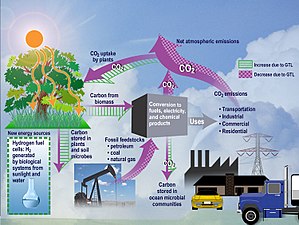
Back علم بيئة النظم Arabic Ecología de sistemas Spanish بومشناسی سیستمها Persian Systeemecologie Dutch Sistemska ekologija Slovenian Системна екологія Ukrainian

Systems ecology is an interdisciplinary field of ecology, a subset of Earth system science, that takes a holistic approach to the study of ecological systems, especially ecosystems.[1][2][3] Systems ecology can be seen as an application of general systems theory to ecology. Central to the systems ecology approach is the idea that an ecosystem is a complex system exhibiting emergent properties. Systems ecology focuses on interactions and transactions within and between biological and ecological systems, and is especially concerned with the way the functioning of ecosystems can be influenced by human interventions. It uses and extends concepts from thermodynamics and develops other macroscopic descriptions of complex systems.
- ^ Shugart, Herman H. (Herman Henry), 1944-; O'Neill, R. V. (Robert V.), 1940- (1979). Systems ecology. Dowden, Hutchinson & Ross. ISBN 0-87933-347-2. OCLC 4664585.
{{cite book}}: CS1 maint: multiple names: authors list (link) CS1 maint: numeric names: authors list (link) - ^ Van Dyne, George M., 1932- (1966). Ecosystems, systems ecology, and systems ecologists. Oak Ridge National Laboratory, Health Physics Divisions. OCLC 4247138.
{{cite book}}: CS1 maint: multiple names: authors list (link) CS1 maint: numeric names: authors list (link) - ^ Wilkinson, David M., 1963- (2006). Fundamental processes in ecology : an earth systems approach. Oxford University Press. ISBN 0-19-856846-0. OCLC 67383832.
{{cite book}}: CS1 maint: multiple names: authors list (link) CS1 maint: numeric names: authors list (link)
© MMXXIII Rich X Search. We shall prevail. All rights reserved. Rich X Search